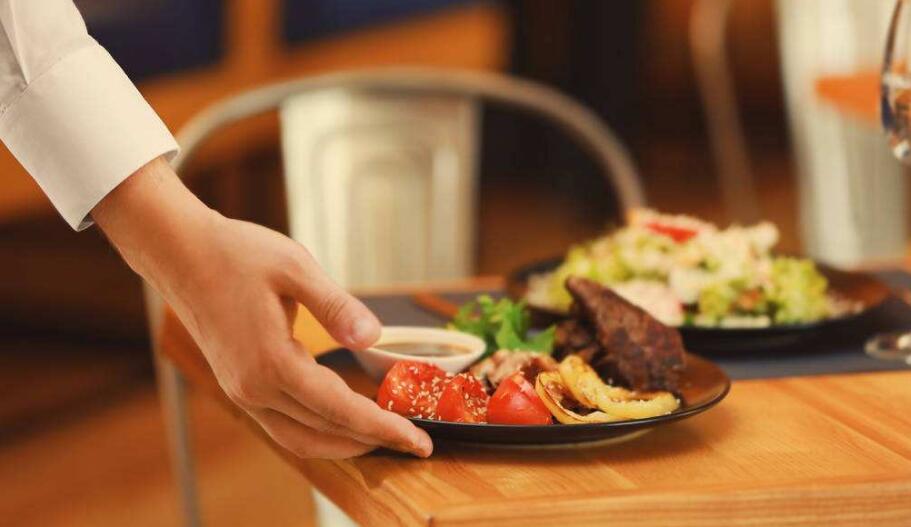
useful Words 第1步 熟悉詞匯
crispy 脆的 salty 咸的 stale 不新鮮的
oily 油膩的 fresh 新鮮的 swallow 吞咽
taste 品嘗 light 清淡的 recipe 食譜
peel 削皮 seasoning 調(diào)味品 chilli 辣椒
garlic 大蒜 vinegar 醋 fussy 愛挑剔的
Useful Sentences 第2步 牢記句型
The dish smells good . My mouth is watering .
這菜聞起來真香,我都流口水了。
Does this taste good ? 這個(gè)嘗起來香嗎?
I could go for a second course . 我想再來一個(gè)菜。
Excuse me , but could you bring me another …,please ?
對(duì)不起,請(qǐng)你在拿……給我,好嗎?
I don’t feel like eating anything . 我什么都不想吃。
It’s delicious . Do you want to try some ? 味道很不錯(cuò)。你想嘗嘗嗎?
Do you want a bite of …? 你要嘗一口……嗎?
1. It smells good . 聞著真香。
The dish smells good . My mouth is watering .
這菜聞起來真香,我都流口水了。
2. Wow , you eat like a horse . 哇,你真能吃。
Don’t eat too much . 別吃太多。
Eat like a horse 吃得很多
3. You eat like a bird . 你吃這么一點(diǎn)啊。
You eat very little . 你吃得這么少啊。
Eat like a bird 吃得極少
4. Is this delicious ? 這個(gè)好吃嗎?
Does this taste good ?這個(gè)嘗起來香嗎?
5. I could go for a second course . 我想再來一個(gè)菜。
Hey man , want to get anther course ? 嘿,伙計(jì),想再來個(gè)菜嗎?
6. The portions at this restaurant are so small .
這個(gè)飯店給的份量太少了。
portion n. 一份
7. Excuse me ,but could you bring me another fork , please ?
對(duì)不起,請(qǐng)你再拿一支叉子給我,好嗎?
Please pass me the vinegar . 請(qǐng)把醋遞給我。
8. Look , this meat is still pink . 瞧,這肉還沒熟。
Waiter , this looks a little red inside . Can I get it cooked a bit more ?
服務(wù)員,這里面看起來有點(diǎn)兒紅,能給我再煮一會(huì)兒嗎?
9. This meat is stale . 這肉變味了。
This meat is tough . 這肉太老了。
This meat is tender . 這肉挺嫩的。
tough adj. 硬的,肉老的 tender adj. 嫩的
10. I really have no room for it . 我撐得實(shí)在吃不下了。
I don’t feel like eating anything . 我什么都不想吃。
11. It’s spicy . 真辣。
It’s salty . 真咸。
Useful Conversations 第3步 模仿對(duì)話
1. 點(diǎn)餐 Order Meal
Waitress : Okay , who ordered the cheeseburger ?
Chuck : That was me . Looks good …
Waitress : Here you go !
Violet : And I had the mixed green salad .
Waitress : I’ve got that right here for you .
Violet : Thanks , looks great .
Waitress : Can I get you two anything else while I’m here ?
Chuck : No , I think we’re good , thanks !
女服務(wù)員:好嘍,哪位點(diǎn)了芝士漢堡?
查 克:是我。看起來不錯(cuò)……
女服務(wù)員:給您!
薇爾莉特:我點(diǎn)了什錦蔬菜沙拉。
女服務(wù)員:我已經(jīng)為您端來了。
薇爾莉特:謝謝,看起來很棒。
女服務(wù)員:現(xiàn)在兩位還需要其他的嗎?
查 克:不用了,我想我們都好了,謝謝!
cheeseburger n. 芝士漢堡 the mixed green salad 什錦蔬菜沙拉
2. 沙拉與漢堡 Salad and Burgers
Chuck : How is your green salad , Violet ?
Violet : It’s delicious . Do you want to try some ?
Chuck : Sure . Do you want a bite of my cheeseburger ?
Violet : No , thanks , I don’t really like burgers .
Chuck : Really ? Why ? Everybody likes burgers .
Violet : Well , actually I’m trying to lose weight .
Chuck : Haha , me too ! But I’m not following my diet very closely …
Violet : Well , I guess we can indulge every once in a while .
Chuck : That’s the spirit !
Violet : Okay , I will have a bite !
Chuck :I thought so , here , let me cut off a piece for you .
Violet : Oh , it’s so good ! Thanks !
Chuck : Anytime .
查 克:你的什錦蔬菜沙拉味道怎么樣,維爾利特?
維爾利特:味道很不錯(cuò)。你想嘗嘗嗎?
查 克:好啊。你要嘗一口我的芝士漢堡嗎?
維爾利特:不用了,謝謝。我確實(shí)不喜歡吃漢堡。
查 克:是嗎?為什么?大家都喜歡漢堡的。
維爾利特:好吧,實(shí)際上我在減肥。
查 克:哈哈,我也是!但是我并不嚴(yán)格地控制飲食……
維爾利特:是啊,我認(rèn)為我們該時(shí)常放縱一下。
查 克:就應(yīng)該這樣!
維爾利特:好吧,那我嘗一口吧!
查 克:早該如此,來,我給你切一塊。
維爾利特:哦,太美味了!謝謝!
查 克:樂意為你效勞。
indulge v. 縱容 once in a while 偶爾,間或
Useful Paragraph 第4步 誦讀短篇
Man’s dearest possession is life . It is given to him but once , and he must live it so as to feel no torturing regrets for wasted years , never know the burning shame of a mean and petty past ; so live that , dying , he might say ; all my life , all my strength were given to the finest cause in all the world ----the fight for the liberation of mankind .
人最寶貴的東西是生命。生命對(duì)每個(gè)人來說只有一次。因此,人的一生應(yīng)當(dāng)這樣度過:當(dāng)回首往事時(shí),不因虛度年華而悔恨,不因碌碌無為而羞愧;這樣,在臨死的時(shí)候,能夠說,我把整個(gè)生命和全部精力都獻(xiàn)給了人生最寶貴的事業(yè)------為人類的解放事業(yè)而奮斗。
possession n. 所有,占有 torturing adj. 充滿痛苦的
petty adj. 瑣碎的,不重要的 liberation n. 解放
Cultural Background 第5步 了解文化
西餐就餐時(shí),有些禮儀是必須知道的:就座時(shí),身體要端正,手肘不要放在桌面上,不可蹺足。餐臺(tái)上已擺好的餐具不要隨意擺弄。將餐巾對(duì)折輕輕放在膝上。使用刀叉進(jìn)餐時(shí),從外側(cè)往內(nèi)側(cè)取用刀叉,要左手持叉,右手持刀;切東西時(shí)左手拿叉按住食物,右手執(zhí)刀將其鋸切成小塊,然后用叉子送入口中。進(jìn)餐中放下刀叉時(shí),應(yīng)擺成“八”子型,分別放在餐盤邊上。刀刃朝向自身,表示還要繼續(xù)吃。每吃完一道菜,將刀叉并攏放在盤中。如果是談話,可以拿著刀叉,無需放下。不用刀時(shí),也可以用右手持叉,但若需要作手勢時(shí),就應(yīng)放下刀叉,千萬不可手執(zhí)刀叉在空中揮舞搖晃,也不要一手拿刀或叉,而另一支手拿餐巾擦嘴,也不可一手拿酒杯,另一只手拿叉取菜。
更多精彩內(nèi)容分享可關(guān)注優(yōu)朗英語官方網(wǎng)站,會(huì)不定期推送!












